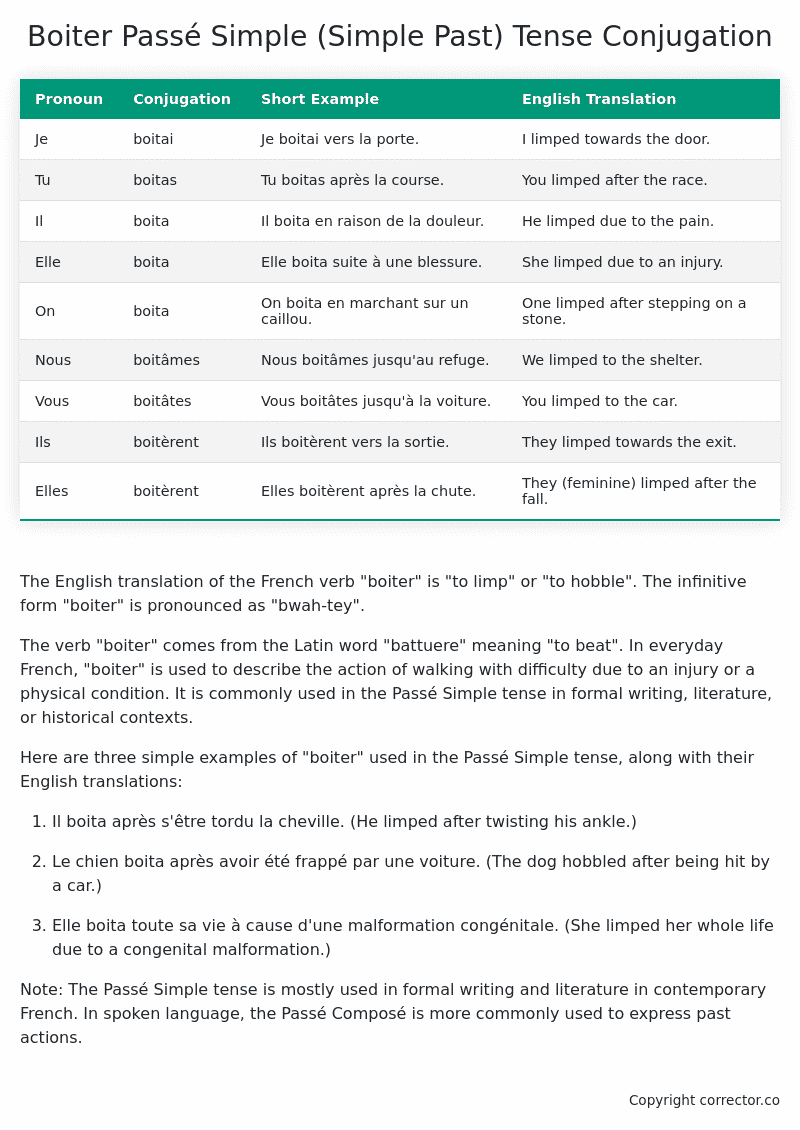Passé Simple (Simple Past) Tense Conjugation of the French Verb boiter
Introduction to the verb boiter
The English translation of the French verb “boiter” is “to limp” or “to hobble”. The infinitive form “boiter” is pronounced as “bwah-tey”.
The verb “boiter” comes from the Latin word “battuere” meaning “to beat”. In everyday French, “boiter” is used to describe the action of walking with difficulty due to an injury or a physical condition. It is commonly used in the Passé Simple tense in formal writing, literature, or historical contexts.
Here are three simple examples of “boiter” used in the Passé Simple tense, along with their English translations:
-
Il boita après s’être tordu la cheville.
(He limped after twisting his ankle.) -
Le chien boita après avoir été frappé par une voiture.
(The dog hobbled after being hit by a car.) -
Elle boita toute sa vie à cause d’une malformation congénitale.
(She limped her whole life due to a congenital malformation.)
Note: The Passé Simple tense is mostly used in formal writing and literature in contemporary French. In spoken language, the Passé Composé is more commonly used to express past actions.
Table of the Passé Simple (Simple Past) Tense Conjugation of boiter
| Pronoun | Conjugation | Short Example | English Translation |
|---|---|---|---|
| Je | boitai | Je boitai vers la porte. | I limped towards the door. |
| Tu | boitas | Tu boitas après la course. | You limped after the race. |
| Il | boita | Il boita en raison de la douleur. | He limped due to the pain. |
| Elle | boita | Elle boita suite à une blessure. | She limped due to an injury. |
| On | boita | On boita en marchant sur un caillou. | One limped after stepping on a stone. |
| Nous | boitâmes | Nous boitâmes jusqu’au refuge. | We limped to the shelter. |
| Vous | boitâtes | Vous boitâtes jusqu’à la voiture. | You limped to the car. |
| Ils | boitèrent | Ils boitèrent vers la sortie. | They limped towards the exit. |
| Elles | boitèrent | Elles boitèrent après la chute. | They (feminine) limped after the fall. |
Other Conjugations for Boiter.
Le Present (Present Tense) Conjugation of the French Verb boiter
Imparfait (Imperfect) Tense Conjugation of the French Verb boiter
Passé Simple (Simple Past) Tense Conjugation of the French Verb boiter (You’re reading it right now!)
Passé Composé (Present Perfect) Tense Conjugation of the French Verb boiter
Futur Simple (Simple Future) Tense Conjugation of the French Verb boiter
Futur Proche (Near Future) Tense Conjugation of the French Verb boiter
Plus-que-parfait (Pluperfect) Tense Conjugation of the French Verb boiter
Passé Antérieur (Past Anterior) Tense Conjugation of the French Verb boiter
Futur Antérieur (Future Anterior) Tense Conjugation of the French Verb boiter
Subjonctif Présent (Subjunctive Present) Tense Conjugation of the French Verb boiter
Subjonctif Passé (Subjunctive Past) Tense Conjugation of the French Verb boiter
Subjonctif Imparfait (Subjunctive Imperfect) Tense Conjugation of the French Verb boiter
Subjonctif Plus-que-parfait (Subjunctive Pluperfect) Tense Conjugation of the French Verb boiter
Conditionnel Présent (Conditional Present) Tense Conjugation of the French Verb boiter
Conditionnel Passé (Conditional Past) Tense Conjugation of the French Verb boiter
Conditionnel Passé II (Conditional Past II) Tense Conjugation of the French Verb boiter
L’impératif Présent (Imperative Present) Tense Conjugation of the French Verb boiter
L’impératif Passé (Imperative Past) Tense Conjugation of the French Verb boiter
L’infinitif Présent (Infinitive Present) Tense Conjugation of the French Verb boiter
L’infinitif Passé (Infinitive Past) Tense Conjugation of the French Verb boiter
Le Participe Présent (Present Participle) Tense Conjugation of the French Verb boiter
Le Participe Passé (Past Participle) Tense Conjugation of the French Verb boiter
Struggling with French verbs or the language in general? Why not use our free French Grammar Checker – no registration required!
Get a FREE Download Study Sheet of this Conjugation 🔥
Simply right click the image below, click “save image” and get your free reference for the boiter Passé Simple tense conjugation!

Boiter – About the French Passé Simple (Simple Past) Tense
Formation
Usage
Narration
Historical Context
Interactions with other tenses
Passé Composé
Imparfait
Conditional and Subjunctive
Summary
I hope you enjoyed this article on the verb boiter. Still in a learning mood? Check out another TOTALLY random French verb conjugation!


